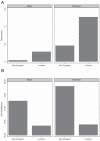Psychological Well-Being Among Informal Caregivers in the Canadian Longitudinal Study on Aging: Why the Location of Care Matters
- PMID: 32906145
- PMCID: PMC7664311
- DOI: 10.1093/geronb/gbaa159
Psychological Well-Being Among Informal Caregivers in the Canadian Longitudinal Study on Aging: Why the Location of Care Matters
Abstract
Objectives: A caregiving stress perspective suggests that caregiving harms psychological well-being in informal caregivers, whereas a caregiving rewards perspective suggests that provision of care benefits psychological well-being. This research examines whether both perspectives apply to caregiving experiences, but differently by the primary location of caregiving (i.e., in-home, other residence, and institution), as well as by gender.
Methods: We analyzed depression and life satisfaction in the nationally representative Canadian Longitudinal Study on Aging (N = 48,648), first comparing noncaregivers (N = 27,699) to a combined caregiver group (N = 20,949) and then stratifying caregivers by the primary location of care.
Results: When considered as a single group, caregivers suffered relative to noncaregivers in terms of life satisfaction and depression. When stratified by the location of care, only in-home caregivers reported both greater depression and lower life satisfaction. Nonresidential caregivers did not differ significantly in levels of depression from noncaregivers and reported higher life satisfaction. Institutional caregivers reported greater depression than noncaregivers, but did not differ significantly in life satisfaction. These patterns were stronger among women than men.
Discussion: Both the caregiving stress and caregiving rewards perspectives are applicable to the caregiving experience, with the stress perspective more applicable to in-home caregivers and the rewards perspective more relevant to nonresidential caregivers. Recommendations include targeted practice focused on the location of care as well as the gender of the caregiver. Given that nonresidential caregivers actually benefit from providing care, interventions need to focus on identifying and bolstering positive aspects of the caregiving experience.
Keywords: CLSA; Depression; Life satisfaction; Positive aspects of caregiving; Stress process model.
© The Author(s) 2020. Published by Oxford University Press on behalf of The Gerontological Society of America.
Figures
Similar articles
-
Levels of Depression and Anxiety Among Informal Caregivers During the COVID-19 Pandemic: A Study Based on the Canadian Longitudinal Study on Aging.J Gerontol B Psychol Sci Soc Sci. 2022 Sep 1;77(9):1740-1757. doi: 10.1093/geronb/gbac035. J Gerontol B Psychol Sci Soc Sci. 2022. PMID: 35150268 Free PMC article.
-
Positive Appraisal of Caregiving for Intensive Care Unit Survivors: A Qualitative Secondary Analysis.Am J Crit Care. 2020 Sep 1;29(5):340-349. doi: 10.4037/ajcc2020953. Am J Crit Care. 2020. PMID: 32869072
-
Predictors of caregiving satisfaction in informal caregivers of people with dementia.Arch Gerontol Geriatr. 2015 May-Jun;60(3):380-8. doi: 10.1016/j.archger.2015.03.002. Epub 2015 Mar 14. Arch Gerontol Geriatr. 2015. PMID: 25814205
-
Spouses' experience of caregiving for cancer patients: a literature review.Int Nurs Rev. 2013 Jun;60(2):178-87. doi: 10.1111/inr.12000. Epub 2012 Nov 21. Int Nurs Rev. 2013. PMID: 23692000 Review.
-
The impact of sex and gender on burden for caregivers of stroke patients: A narrative review.J Stroke Cerebrovasc Dis. 2024 Nov;33(11):107854. doi: 10.1016/j.jstrokecerebrovasdis.2024.107854. Epub 2024 Jul 14. J Stroke Cerebrovasc Dis. 2024. PMID: 39004239 Review.
Cited by
-
Mental Health Benefits and Detriments of Caregiving Demands: A Nonlinear Association in the Canadian Longitudinal Study on Aging.J Aging Health. 2023 Jun;35(5-6):392-404. doi: 10.1177/08982643221125258. Epub 2022 Sep 14. J Aging Health. 2023. PMID: 36112750 Free PMC article.
-
Influence of dementia literacy and caregiving appraisal on the psychological wellbeing of informal caregivers of people with dementia: A cross-sectional study.Front Med (Lausanne). 2022 Sep 14;9:971481. doi: 10.3389/fmed.2022.971481. eCollection 2022. Front Med (Lausanne). 2022. PMID: 36186770 Free PMC article.
-
Levels of Depression and Anxiety Among Informal Caregivers During the COVID-19 Pandemic: A Study Based on the Canadian Longitudinal Study on Aging.J Gerontol B Psychol Sci Soc Sci. 2022 Sep 1;77(9):1740-1757. doi: 10.1093/geronb/gbac035. J Gerontol B Psychol Sci Soc Sci. 2022. PMID: 35150268 Free PMC article.
-
The Effect of Loneliness on Cognitive Functioning Among Healthy Individuals in Mid- and Late-Adulthood: Evidence From the Canadian Longitudinal Study on Aging (CLSA).Front Psychol. 2021 Sep 3;12:701305. doi: 10.3389/fpsyg.2021.701305. eCollection 2021. Front Psychol. 2021. PMID: 34539500 Free PMC article.
-
Prevalence and correlates of anxiety and depression in caregivers to assisted living residents during COVID-19: a cross-sectional study.BMC Geriatr. 2022 Aug 12;22(1):662. doi: 10.1186/s12877-022-03294-y. BMC Geriatr. 2022. PMID: 35962356 Free PMC article.
References
-
- Andresen E M, Malmgren J A, Carter W B, & Patrick D L (1994). Screening for depression in well older adults: Evaluation of a short form of the CES-D (Center for Epidemiologic Studies Depression Scale). American Journal of Preventive Medicine, 10(2), 77–84. doi: 10.1016/S0749-3797(18)30622-6 - DOI - PubMed
-
- Arai Y, Kumamoto K, Mizuno Y, & Washio M (2014). Depression among family caregivers of community-dwelling older people who used services under the Long Term Care Insurance program: A large-scale population-based study in Japan. Aging & Mental Health, 18(1), 81–91. doi: 10.1080/13607863.2013.787045 - DOI - PubMed
-
- Berg-Weger M, Rubio D M, & Tebb S S (2000). Living with and caring for older family members: Issues related to caregiver well-being. Journal of Gerontological Social Work, 33(2), 47–62. doi: 10.1300/j083v33n02_04 - DOI
Publication types
MeSH terms
LinkOut - more resources
Full Text Sources
Medical



